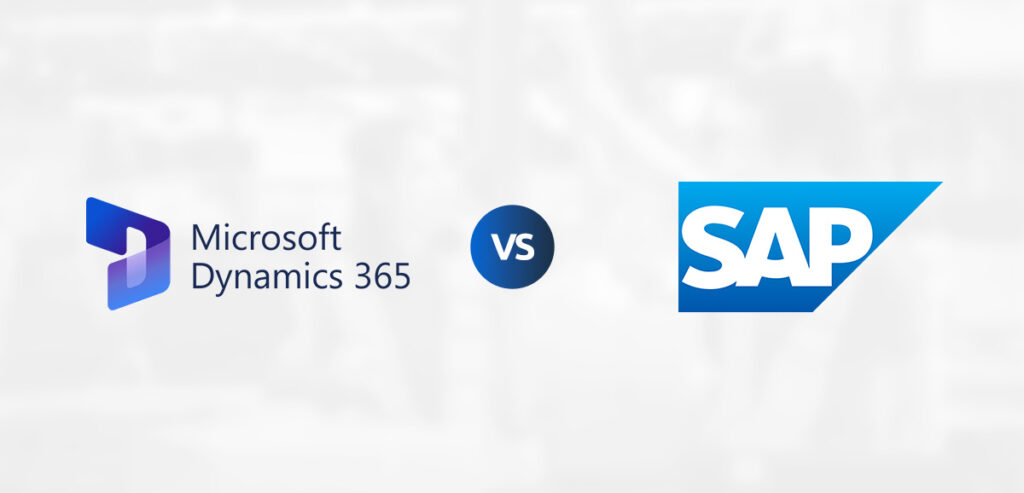
Enterprise resource planning (ERP) systems can help boost your business’s productivity and efficiency. With the right tools, managers and executives can improve departmental workflows and collaboration. But how do you choose the best ERP system for the job?
Microsoft Dynamics 365 and SAP are two leaders in ERP systems. Both offer powerful tools for driving growth, but they have some differences. Compare SAP and Microsoft Dynamics 365 to find the right fit for your manufacturing, metals or distribution company.
Microsoft Dynamics 365 is a cloud-based ERP platform built to fit your business’s unique needs. Its modular design lets you choose only the features you want. Unlike traditional ERP systems, Dynamics 365 integrates natively with Microsoft tools like Excel, Teams and Power BI. You get a solution that works with familiar technology and delivers easy use. The system also features flexible deployment options, customizable workflows and artificial intelligence (AI)-driven insights.
SAP is another well-established ERP system. It’s known for serving large, global enterprises with complex operations. It’s a comprehensive platform that supports everything from finance to supply chain planning. SAP is traditionally on-premises, although it does come with cloud options. It offers quality user interfaces and high scalability and is an excellent tool for managing highly specialized processes.
If you want an ERP solution that suits your business and industry, you need to know what each platform does. Here’s a SAP and Microsoft Dynamics comparison to help you get the best ERP system for the job:
Due to its cloud-based structure and modular design, implementing Dynamics 365 is faster than many other ERP systems. Businesses can start with essential features and add more as their needs evolve. This system gives you more flexibility and faster deployment. If you want easier implementation and deployment, Microsoft Dynamics 365 stands out.
SAP has longer, more complex implementation timelines. It is highly customized, requiring more support from technical consultants. While SAP offers cloud solutions, its long-term position as an on-premises solution can create challenges for businesses looking for agility and speed.
Customization is a core strength of Microsoft Dynamics 365. The modular design lets you tailor the system to your specific needs. Enjoy an intuitive, user-friendly interface as well. With Microsoft’s familiar design, companies get a reduced learning curve. Customize workflows, reports and dashboards with low-code/no-code tools like Power Apps.
SAP offers complex configuration abilities. While it adjusts to your company, you might need SAP-certified consultants to help your team achieve the customization you want. The system’s interface is less intuitive, and you’ll need to train end-users on how to set it up. Like Dynamics 365, you can create custom workflows, but they require more technical investment.

Dynamics 365 operates on a pay-as-you-go model, reducing upfront costs. If you choose cloud-based deployment, you’ll also reduce overall maintenance costs. With cloud-based ERP platforms, there’s no need for costly on-site infrastructure or extensive IT teams. You’ll pay for what you need, as you need, with minimal maintenance expenses.
SAP works on a licensing model, which means larger upfront payments. These costs are even higher if you get on-premises deployments. Since the system requires higher technical skills to navigate, you might also need to budget for consulting and technical support costs. Like Dynamics, cloud-based SAP options will have lower maintenance costs, but they will likely still be more expensive overall than Microsoft’s system.
One of Dynamic 365’s biggest advantages is its seamless integration with the Microsoft ecosystem. Businesses can use all the familiar tools plus Dynamic’s features to access real-time data, collaborate and streamline workflows. Third-party integrations are also available through Microsoft’s marketplace.
SAP works well with other SAP products, but integrating third-party apps can be more challenging. You might need middleware or custom development. These will add additional expenses and labor to your setup. SAP’s integration tools have improved with its move to the cloud, but they still fall behind Dynamic 365’s scope and simplicity.
Microsoft Dynamics 365 offers fast, flexible scalability for businesses in the distribution and manufacturing industries. Start with the essential features and expand into other areas as you grow. You can add applications like finance, supply chain management or customer service as you get used to the software and create a centralized space for your teams. The cloud-based deployment means you can scale up or down quickly without extensively changing your infrastructure.
SAP is designed for larger companies with complex needs, but its scalability is more rigid. With SAP, you get a wide range of tools, but adding new features means investing in technical support and reconfiguration. On-premises deployments will be more expensive and time-consuming, but SAP can scale to meet your business requirements.
Choosing between SAP and Microsoft Dynamics 365 depends on your company’s size, goals and operation. Both systems offer powerful ERP capabilities but cater to different business types.
If you want flexible, fast and cost-effective ERP solutions, choose Microsoft Dynamics 365. Businesses that need rapid scalability, easy customization and seamless integration with other Microsoft tools can get started quickly with this platform. It’s the better option for companies looking for shorter implementation timelines and less technical involvement. Pick Microsoft’s ERP system and enjoy a more user-friendly experience.
SAP can be the right fit for large companies with complex, unique processes. If you already use other SAP products, remaining in the SAP ecosystem might be easier. If you’re dealing with large legacy systems, you might need the additional support and timelines of SAP. Companies that can handle longer implementation timelines, higher customization needs and heavier IT resources should pick SAP.

ERP systems are a complicated industry that can provide efficient, scalable solutions. As a Microsoft ERP Gold Certified Partner, Winfosoft is uniquely qualified to provide you with the right system for your needs. We specialize in helping distribution, metals, and manufacturing companies get the most out of Microsoft Dynamics 365. Our team provides personalized, end-to-end ERP implementation services to support you.
Winfosoft’s tailored approach adapts to your unique needs. We know your industry and can offer unmatched expertise that works with your operation. Whether you need to streamline production or manage inventory, we can help you cut costs and drive profitability — partner with a trusted, award-winning leader in Microsoft Dynamics 365. Contact us today to schedule your consultation!